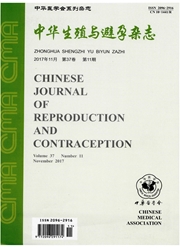

 中文摘要:
中文摘要:
目的:探讨肥胖类型与性激素水平的关系。方法:采用横断面研究,以927例中老年男性为对象,统一获得其体质量指数(BMI)、腰高比(WHtR),测定血清总睾酮(TT)、性激素结合球蛋白(SHBG),并计算游离睾酮(CFT)和生物利用性睾酮(Bio—T),分析BMI、WHtR与性激素相关性,比较不同WHtR组性激素水平,并应用Logistic回归分析WHtR、肥胖类型与性激素低下关联。结果:WHtR与所有性激素指标TT、cFT、Bio—T和SHBG呈负相关fP〈0.05).而BMI仅与TT、SHBG呈负相关(P〈0.05);与低WHtR组(WHtR≤0.5)比,高WHtR组(WHtR〉0.5)血清TT、cFT、Bio—T和SHBG均显著下降(P〈0.05)。Logistic模型显示,双重肥胖组即BMI和wHtR都超标者,TT和cFT低下风险增加(P〈0.05),但仅有一般性肥胖或中心性肥胖与TT、cFT低下关联未显示统计学差异(P〉0.05)。结论:一般性肥胖和中心性肥胖共存是中老年男性血清TT、cFT低下的危险因素。
 英文摘要:
英文摘要:
Objective: To examine the relationships between the obesity type and the level of serum sexual hormones. Methods: A total of 954 men aged 40-80 years were drawn from a cross-sectional study. Body mass index (BMI) and waist-to-height ratio (WHtR) were measured. Serum levels of total testosterone (TT), sex hormone- binding globulin (SHBG) and albumin (ALB) were tested. Bioavailable testosterone (Bio-T), calculated free testosterone (cFT) were calculated. The correlations between BMI, WHtR and sexual hormones were analyzed and means of sexual hormones in different WHtR groups were compared in total and in stratified age groups. Binary logistic model was employed to examine the relationships between WHtR, obesity type and TT, eFT deficiency. Results: WHtR was negatively correlated with TT, cFT, Bio-T and SHBG while BMI was only negatively correlated with TT and SHBG. In group ofWHtR〉0.5, TT, cFT, Bio-T and SHBG decreased significantly (P〈0.05). Logistic regression showed, for the group that combined general obesity with central obesity, the risk of sexual hormone deficiency increased significantly (P〈0.05). For groups of general obesity or central obesity alone, the decrease of sexual hormones didn't show significance (P〉0.05). Conclusion: General obesity accompanied with central obesity was a risk factor for sexual hormone deficiency to middle-aged and elderly men.
 同期刊论文项目
同期刊论文项目
 同项目期刊论文
同项目期刊论文
 期刊信息
期刊信息
